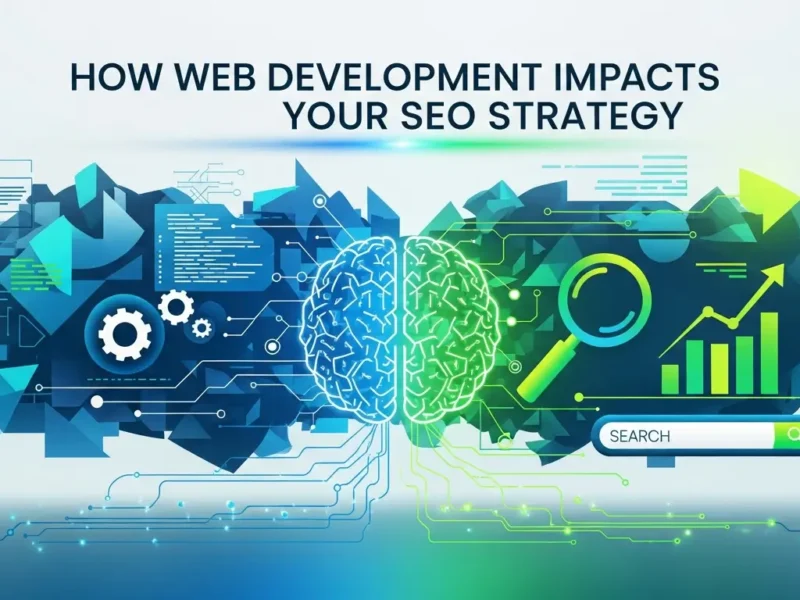The digital landscape is a battlefield, and your website is your command center. For businesses of all sizes, a robust and effective online presence isn’t just a luxury; it’s a necessity for survival and growth. But when it comes to web development, the journey can feel like navigating a dense jungle without a compass. A crucial decision arises early on: who will build this digital command center? This article will delve into the critical differences between web development needs for small businesses and large enterprises, guiding you to find the perfect web development partner for your unique objectives.
Understanding Your Web Development Needs
Before you even begin your search for a web development partner, a crucial first step is to thoroughly understand your own needs and goals. What works for a bustling multinational corporation will likely be overkill – or entirely insufficient – for a local startup.
The Small Business Web Development Landscape
Small businesses often operate with tighter budgets, leaner teams, and a more immediate need to establish an online presence. Their web development requirements typically prioritize:
- Cost-effectiveness: Every penny counts, so solutions need to be affordable without sacrificing essential functionality.
- Speed to market: Getting a functional website up and running quickly is often a priority to start attracting customers and generating revenue.
- Scalability for growth: While initial needs might be modest, the website should be built with future expansion in mind, allowing for new features and increased traffic.
- Ease of management: Small business owners or their limited staff often need to make minor updates themselves, so a user-friendly CMS (Content Management System) is vital.
- Local SEO focus: Many small businesses serve a local clientele, so optimization for local search is paramount.
Imagine a charming bakery wanting an online menu, order form, and a blog to share recipes. Their focus is on showcasing their products, making it easy for customers to order, and potentially building a local community. They don’t need complex CRM integrations or enterprise-level security protocols right out of the gate.
The Enterprise Web Development Universe
Enterprises, on the other hand, often have complex organizational structures, diverse departments, and a global reach. Their web development demands are consequently far more intricate. When considering enterprise software development services, large organizations require partners capable of delivering solutions with:
- Robust security: Handling vast amounts of sensitive customer data and transactions requires top-tier security measures.
- High performance and uptime: Websites must be able to handle massive traffic spikes and maintain near-perfect uptime to avoid costly disruptions.
- Complex integrations: Seamless integration with existing CRM, ERP, marketing automation, and other internal systems is non-negotiable.
- Custom functionality: Enterprise solutions often require bespoke features tailored to unique business processes and competitive advantages.
- Scalability for massive growth: The ability to scale infrastructure, handle millions of users, and support diverse product lines is critical.
- Global reach and localization: Websites need to cater to multiple languages, currencies, and regional preferences.
- Dedicated support and maintenance: Ongoing support, proactive monitoring, and rapid incident response are essential.
Consider a global e-commerce giant processing millions of transactions daily, managing intricate supply chains, and offering personalized experiences across numerous markets. Their website is the core of their operations, demanding an infrastructure that can withstand immense pressure and constant evolution.
Key Considerations When Choosing Your Web Development Partner
Regardless of your business size, several universal factors come into play when selecting a web development partner. However, the weight given to each factor will shift based on your specific context.
1. Experience and Expertise
- Small Business: Look for partners with a proven track record of building effective websites for businesses similar to yours. Do they understand your industry? Can they showcase successful projects with limited budgets?
- Enterprise: Seek out firms with extensive experience in large-scale projects, complex integrations, and a deep understanding of enterprise architecture. Ask about their experience with specific technologies relevant to your existing systems.
2. Portfolio and Case Studies
A development partner’s past work speaks volumes.
- Small Business: Look for portfolios that demonstrate clean design, user-friendly interfaces, and practical functionalities that align with common small business needs (e.g., e-commerce, booking systems, informational sites).
- Enterprise: Examine case studies that detail complex challenges overcome, significant ROI achieved, and robust solutions implemented for large organizations. Pay attention to the technical depth and strategic thinking involved.
3. Technology Stack and Future-Proofing
The choice of technology (programming languages, frameworks, CMS) profoundly impacts your website’s performance, security, and future scalability.
- Small Business: Often benefit from popular, user-friendly CMS platforms like WordPress or Squarespace, which offer flexibility and a vast ecosystem of plugins. Ensure the chosen stack can scale as your business grows.
- Enterprise: May require custom-built solutions or advanced platforms like Magento for e-commerce, Drupal for complex content management, or custom frameworks built on technologies like Python, Java, or .NET. The focus is on robust, scalable, and maintainable architecture.
4. Team Structure and Communication
Effective collaboration is the bedrock of successful web development.
- Small Business: You might work directly with a smaller team or even a single developer. Clear communication channels and responsiveness are key.
- Enterprise: You’ll likely engage with a larger, multidisciplinary team including project managers, solution architects, UI/UX designers, front-end and back-end developers, QA specialists, and DevOps engineers. Structured communication protocols and dedicated account managers are essential.
5. Project Management and Methodology
How a partner manages a project can significantly impact its success.
- Small Business: Often benefit from agile methodologies that allow for flexibility and iterative development, adapting to evolving needs quickly.
- Enterprise: May utilize more formalized project management approaches (e.g., Waterfall for specific components, or scaled Agile frameworks) due to the sheer complexity and number of stakeholders involved.
6. Cost and Budget Alignment
The financial investment required will vary wildly between a small business and an enterprise project.
- Small Business: Look for transparent pricing models, fixed-price contracts for well-defined scopes, or clear hourly rates. Be wary of hidden fees.
- Enterprise: Be prepared for substantial investments, often structured into phases, with detailed proposals outlining costs for discovery, design, development, testing, deployment, and ongoing support. Value is often measured by ROI over time.
7. Ongoing Support and Maintenance
A website is never truly “finished.” It requires continuous care.
- Small Business: May opt for basic maintenance packages, security updates, and occasional content updates.
- Enterprise: Demands comprehensive SLAs (Service Level Agreements) covering everything from uptime guarantees, performance monitoring, proactive security patches, emergency support, and emergency web development services.
Freelancers, Agencies, and Enterprise Solutions Providers
The market offers a diverse range of web development partners, each with its own strengths and weaknesses.
- Freelancers: Often a cost-effective option for small, straightforward projects. They offer personalized attention but may have limited bandwidth or specialized skills. Ideal for very small businesses with clear, simple requirements.
- Small to Mid-Sized Web Agencies: Offer a more comprehensive team (designers, developers, project managers) and can handle a broader range of projects. They often specialize in specific industries or technologies. Excellent for small businesses looking for a balance of cost, quality, and support, and for mid-sized businesses with growing needs.
- Enterprise Web Development Firms/System Integrators: These are large organizations with extensive teams, deep technical expertise, and a proven ability to deliver complex, large-scale solutions. They often specialize in specific enterprise platforms (e.g., Salesforce, SAP) and offer end-to-end services, from consulting to ongoing managed services. Exclusively for large enterprises with intricate demands and substantial budgets.
Making the Right Choice: A Strategic Approach
- Define Your Goals Clearly: What do you want your website to achieve? Be specific with quantifiable metrics where possible (e.g., “increase online sales by 20%”, “reduce customer support calls by 15%”).
- Assess Your Current State: What existing systems need to be integrated? What are your current technological limitations?
- Determine Your Budget: Be realistic about what you can invest. This will significantly narrow down your options.
- Create a Detailed RFP (Request for Proposal): Especially crucial for enterprises, but beneficial for small businesses too. Outline your requirements, project scope, desired functionalities, and evaluation criteria.
- Interview Potential Partners: Ask probing questions about their process, experience with similar projects, and how they handle challenges.
- Check References: Speak to their past clients to get an unbiased perspective on their capabilities and reliability.
- Review Contracts Thoroughly: Understand deliverables, timelines, payment schedules, and ongoing support agreements.
Conclusion: Your Digital Future Awaits
Choosing the right web development partner is a pivotal decision that will shape your online presence and ultimately, your business’s success. For small businesses, it’s about finding an agile, cost-effective partner who can quickly launch a functional, scalable website. For enterprises, it’s about securing a strategic ally capable of delivering complex, secure, high-performance solutions that integrate seamlessly with existing infrastructure and support global operations.



